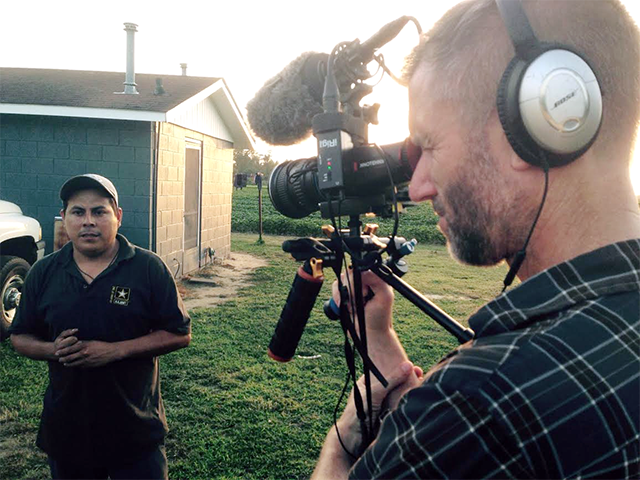When Joanna Welborn returned to Student Action with Farmworkers to join the staff as an assistant director in 2008 after a decade-long hiatus, her main goal was to use the photography and skills she gained from nonprofit work to make an impact.
Welborn first participated with the SAF program in 1996, as a college student with the student summer internship program, Into The Fields. SAF is a nonprofit organization located in Durham dedicated to bring students and farmworkers together to improve conditions for farmworkers and create social change.
“I was a student at [Appalachian State University], and an SAF alumnus came to my sociology class,” Welborn said. “I remember, really distinctly, that moment, she showed some photographs of farmworker housing. I had grown up in Morganton, North Carolina, like, right across the street, and literally had no idea that in my backyard, just a few miles away, there were workers being treated this way.”
Welborn said the presentation from that SAF alumni student prompted her to action as a young student at App State.
“She showed these photographs of farmworker housing, really like run-down shacks,” Welborn said. “Labor camps where there are hardly any regulations. You can have just beds and beds and beds and one room; bathrooms with no privacy between toilets. The regulations for how many sinks you have to have per worker, how many refrigerators, is just so low. I was just really shocked at these photographs and wanted to do something about it.”
Earlier this year, Aaron Thomas, a foreign correspondent at the Special Broadcasting Service out of Australia, reached out to SAF about the possibility of filming a documentary on the Into The Fields program. The documentary was to be a part of SBS’ Dateline television series.
Initially, Welborn and her fellow staff members were a little hesitant about an outside news documentary company wanting to film their organization, and in particular their student intern program.
“He emailed us, and we were a little bit wary [about Dateline] because of the U.S. Dateline, which was more like an exposé,” Wellborn said. “But he sent us a few links and we checked out their website and found they do really interesting, thought-provoking documentaries. I thought it was really interesting that they wanted to tell the story of income inequality, but they wanted to do it in different ways, to show some hope, which is what we’re all about.”
SBS is one of two major broadcasting services in Australia. According to Thomas, the broadcast began many years ago as part of a mandate from its parent company to tell more culturally inclusive stories.
“It was part of a mandate to help integrate immigrants,” Thomas said. “The broadcast started out with a mandate to create a multicultural, all-inclusive approach to society.”
For Thomas and SBS, the SAF program in North Carolina seemed like the perfect integration of immigrant experiences and a social justice issue that they wanted to highlight, income inequality.
“There were two drivers for it, and one is when I heard about this program in North Carolina and what it was doing, obviously the migrant experience part of that was physically relevant to this broadcast, so it was immediate appealing on that front,” Thomas said. “The other front was that, for quite a while, I wanted to do a piece that touches on the income inequality issues in America, and to look on one area where wage inequality was quite stark.”
When Thomas researched more into the SAF organization and its programs, he decided to tell the story of income equality from the perspective of their student program.
“People are sort of fatigued about bad news, so if you want to tackle a subject like inequality, you have to look for more colorful ways to do it,” Thomas said. “One of the ways to make it palpable is to also have a ‘good news’ story happening at the same time of ‘here’s this problem, but here’s some people who are doing something about it.’ There’s something kind of noble about these people volunteering and working to tackle this problem.”
In the film, titled “Bittersweet Harvest” and currently available online since its Oct. 27 release date, Thomas works to highlight some of the key issues that farmworkers and their families face today.
“It seems like one of the biggest problems that was rarely acknowledged was how vulnerable migrant farmworkers were to exploitation, due to they didn’t necessarily have strong English language skills; they were very isolated, didn’t really associate with outside people without the farmowners’ permission; and they didn’t have a very good knowledge of their rights or the American legal system,” Thomas said. “And that’s where Student Action with Farmworkers comes in, getting out there and make those connections.”
According to Welborn, approximately half of the students each year come from farm-working families. Nadia Moreno, a senior studying social work at New Mexico State University, chose to participate in the program this summer to see a different perspective than that of the farm-working town in which she grew up.
“My father was a contracted worker in North Carolina when he first came to the United States,” Moreno said. “He spoke to me of the maltreatment and the hardships farmworkers faced [in North Carolina] and when I found out about the ITF Internship, I knew it was my opportunity to know about the social issues other farmworkers faced.”
Moreno also commented on some of the issues that were highlighted in the film.
“We need to advocate for them to improve their living conditions and the language barrier that they have,” Moreno said. “We need to continue to fight for their rights in order to improve their quality of life. These are individuals that feed our country, yet are treated inhumanely.”
One of the more notable outcomes of the ITF program that the film conveys is the change in students’ demeanor upon the conclusion of the internship.
“Despite it not being the most high profile, sexiest cause in the world, it’s really loving and inspiring in its own way,” Thomas said. “And the students have a great experience where they get to extend themselves, and a percent of students come to a new understanding of their own farm-working heritage and much more pride about that by the end of the program.”
Moreno finally added that, as the documentary aimed to emphasize, farmworkers deserve more respect than the general public gives them currently.
“As individuals, we may think that the conditions and rights of these farmworkers do not affect us personally, but if they stop coming, ‘who will be there to pick the billion-dollar agriculture that we need in order to have food at our tables?’ They make a huge impact on our lives and we tend to ignore it and take it for granted,” Moreno said.





